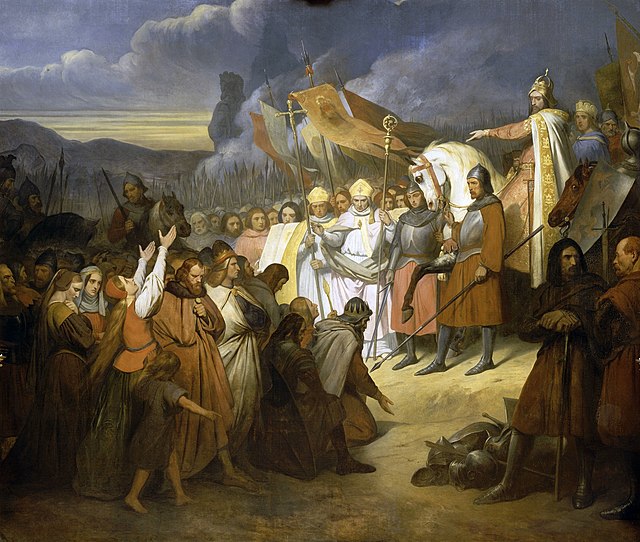Widukind, also known as Wittekind and Wittikund, was a leader of the Saxons and the chief opponent of the Frankish king Charlemagne during the Saxon Wars from 777 to 785. Charlemagne ultimately prevailed, organized Saxony as a Frankish province, massacred thousands of Saxon nobles, and ordered conversions of the pagan Saxons to Christianity. In later times, Widukind became a symbol of Saxon independence and a figure of legend. He is also venerated as a blessed in the Catholic Church.
Modern statue of Widukind in Herford, North Rhine-Westphalia
Charlemagne (742–814) receiving the submission of Witikind at Paderborn in 785, by Ary Scheffer (1795–1858). Versailles.
The Saxons were a group of Germanic peoples whose name was given in the early Middle Ages to a large country near the North Sea coast of northern Germania, in what is now Germany. In the late Roman Empire, the name was used to refer to Germanic coastal raiders, and in a similar sense to the later "Viking". Their origins are believed to be in or near the German North Sea coast where they appear later, in Carolingian times. In Merovingian times, continental Saxons had been associated with the activity and settlements on the coast of what later became Normandy. Their precise origins are uncertain, and they are sometimes described as fighting inland, coming into conflict with the Franks and Thuringians. There is possibly a single classical reference to a smaller homeland of an early Saxon tribe, but its interpretation is disputed. According to this proposal, the Saxons' earliest area of settlement is believed to have been Northern Albingia. This general area is close to the probable homeland of the Angles.

The remains of a seax together with a reconstructed replica
Alfred the Great
The later stem duchy of Saxony (c. 1000 AD), which was based in the Saxons' traditional homeland bounded by the rivers Ems, Eider and Elbe
1868 illustration of Augustine addressing the Saxons






